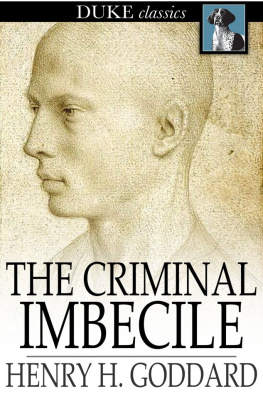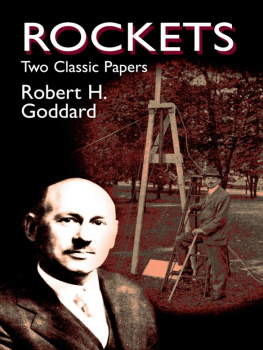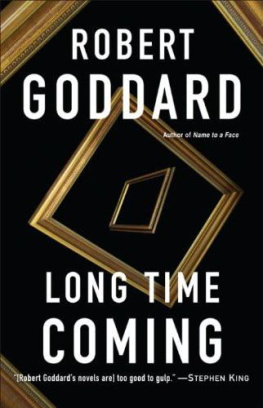THE CRIMINAL IMBECILE
AN ANALYSIS OF THREE REMARKABLE MURDER CASES
* * *
HENRY H. GODDARD
*
The Criminal Imbecile
An Analysis of Three Remarkable Murder Cases
First published in 1915
ISBN 978-1-62013-613-3
Duke Classics
2014 Duke Classics and its licensors. All rights reserved.
While every effort has been used to ensure the accuracy and reliability of the information contained in this edition, Duke Classics does not assume liability or responsibility for any errors or omissions in this book. Duke Classics does not accept responsibility for loss suffered as a result of reliance upon the accuracy or currency of information contained in this book.
Contents
*
Preface
*
This book is offered to the public in the belief that the three casesherein described are typical of a large proportion of criminal cases andthat the analysis and discussion attempted will help to make clearimportant points which are often misunderstood, points relative to thecriminal and to the imbecile.
A clear conception of the nature of the imbecile and of his relation tocrime will inevitably result in a most desirable change in our criminalprocedure.
It should be noted that we use "imbecile" in the legal sense whichincludes the moron and often the idiot as scientifically classified. Thisusage is justified since much of the literature still describes all mentaldefectives as imbeciles, idiots, or feeble-mindedaccording to thepreference of the writers.
These cases are unique in that they were the first court cases in whichthe Binet-Simon tests were admitted in evidence, the mental status ofthese persons under indictment being largely determined by this method.
It happens, also, that these cases well illustrate three phases of theworkings of defective minds. Jean Gianini shows the criminal imbecile ofhigh grade and of loquacious type working by himself. Roland Pennington,equally high grade but of a quiet, phlegmatic temperament, shows how adefective mind works under suggestion. Finally, Tronson shows the crudebrutality of a somewhat lower grade defective.
In the chapter on Responsibility we have tried to indicate the differencebetween verbal morality and deep-seated, appreciated, moral principle. Achild may have the former but the latter comes only with experience andthe age at least of the adolescent.
We would remind the reader that in the confessions and the appendices wehave had at hand only stenographic reports.
If this book shall help the lawyer to make a more successful defense ofthe imbecile criminal, the judge to dispense justice to this muchmisunderstood class of high grade imbeciles, and society in general torealize its responsibility for the mental defective, it will havefulfilled its mission.
H. H. G.
RESEARCH LABORATORY OF THE TRAINING SCHOOL IN VINELAND, N. J.
Chapter I - The Case of Jean Gianini
*
"We find the defendant in this case not guilty as charged; we acquit thedefendant on the ground of criminal imbecility."
Such was the verdict by the jury of the Supreme Court of Herkimer County,New York, on May 28th, 1914, in the case of the people vs. Jean Gianini,indicted for the murder of Lida Beecher, his former teacher.
The prosecution and, at first at least, the majority of the citizens ofthe community held that this had been a carefully planned, premeditated,cold-blooded murder of the most atrocious character, committed with afiendishness seldom seen among human beings. It was, on the other hand,claimed by the defense that the boy was an imbecile, that he had only theintelligence of a ten-year-old child, that he did not know the nature andquality of his act, and that he did not have any true realization of theenormity of his crime. For some reason unaccountable to a great manypeople, the jury accepted the view of the defense.
Not infrequently have verdicts in murder trials been unacceptable to thepopulace. In that respect this verdict is not an exceptional one, but fromother standpoints it is remarkable. Probably no verdict in modern timeshas marked so great a step forward in society's treatment of thewrongdoer. For the first time in history psychological tests ofintelligence have been admitted into court and the mentality of theaccused established on the basis of these facts.
The value of this verdict cannot be overestimated. It establishes a newstandard in criminal procedure. It recognizes that weakness of mind, asan excuse for crime, is of the same importance as disease of mind; putsfeeble-mindedness in the same category with insanity, and requires that itlike insanity be considered in all discussions of responsibility. When weadd the now accepted fact that the feeble-minded are at least as numerousas the insane, we see the far-reaching significance of this standard setby the Supreme Court of Herkimer County, New York.
That the verdict has not been at once acceptable to the people is due tothe fact that the character and the limitations of the high-gradeimbecile are not understood. With a view to explaining this type ofdefective, which the defendant so well illustrates, we propose in thefollowing pages to go over the history of this case, explaining the factsin the light of present-day knowledge of the feeble-minded.
The facts in the case as established by testimony:
On the morning of March 28th, 1914, Henry Fitch, a farmer of HerkimerCounty, accompanied by his son, started on his usual work to deliver milk.At a point in the highway, approximately one mile from the village ofPoland, Mr. Fitch saw blood and signs of a struggle in the snow and slushin the road; he also found an umbrella and a hat. A bloody path led out ofthe road to a point some hundred and thirty feet away. Following thetracks he found the body, which proved to be that of Lida Beecher, one ofthe school-teachers in the village of Poland. She lay at full length onher face, both arms under her. The body was removed to Sprague'sundertaking rooms in the village.
On the same morning Jean Gianini, sixteen years old, left his father'shouse on the edge of the village to go to the home of Sam Hutchinson,where he was working and taking his meals. He had his breakfast, went tothe barn, and worked a short time. When Mr. Hutchinson went out a littlelater, he could not find Jean. A Mr. Smith said he had seen him going downthe tracks toward Newport. William Taylor, the track foreman, said hepassed Jean near the bridge. Mr. Hutchinson then sent word to the boy'sfather that he had gone. The father, supposing his son had run away as hefrequently did, telephoned to Newport asking that he be apprehended andsent home. This was before anything was known of the crime. Peck Newman,to whom the father telephoned, found Jean in a grocery store in Newport.He had been apprehended at the depot. He was taken home and then to theJustice of the Peace. Here he was stripped, presumably for the purpose ofdiscovering whether there was any blood upon his clothing or his body.Although there is no evidence that any stains were found, yet he had nosooner been stripped than he made a free and open confession. We shallconsider this confession in detail later. In substance he said that hekilled Miss Beecher to get revenge, because she had humiliated him inschool. He told in detail how he had accomplished this and what had beenhis movements shortly before and after the deed. On the strength of thisconfession and such corroborative evidence as could be obtained fromlocal witnesses the prosecution sought to convict this boy of murder inthe first degree.















